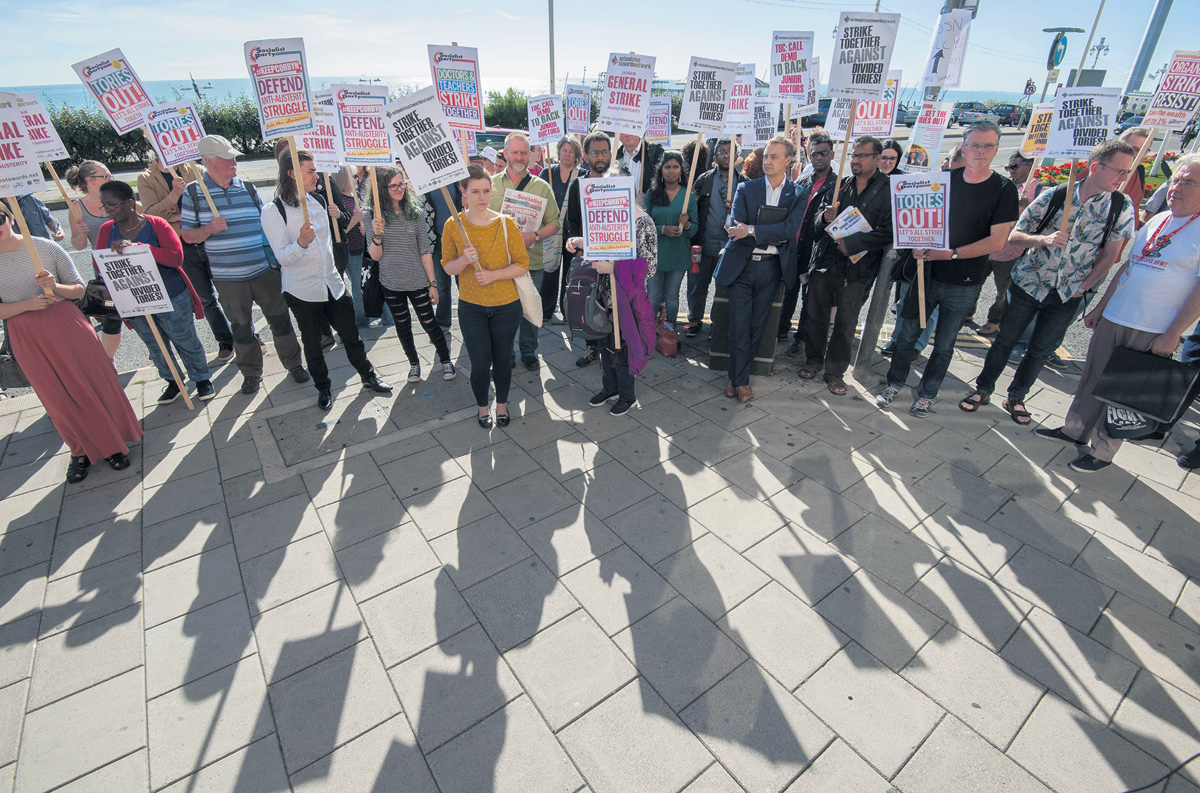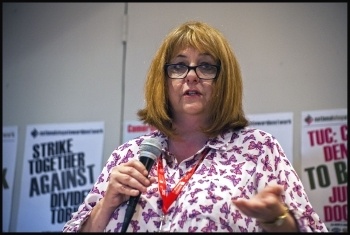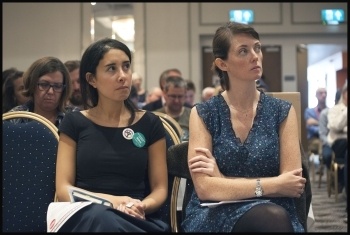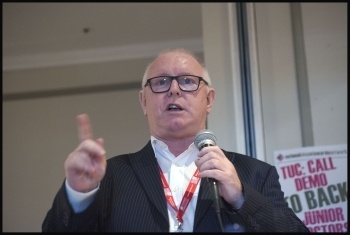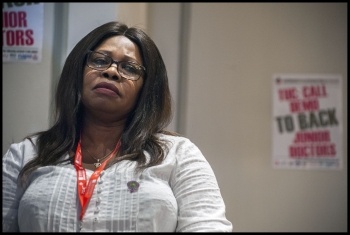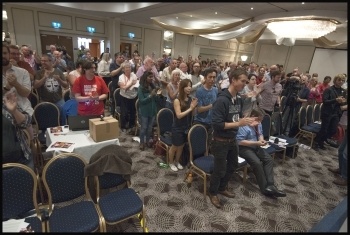National Shop Stewards Network rally 2016
An urgent time for our movement
Up to 250 trade unionists attended this year’s excellent National Shop Stewards Network pre-TUC congress rally in Brighton on 11 September. Sarah Wrack, editor of the Socialist, reports.
“As a junior doctor, I am asking the TUC to call a day of action to support us.” With this firm and clear statement, Aislinn Macklin-Doherty – one of two junior doctor speakers – summed up a major theme of the National Shop Stewards Network’s (NSSN) rally and lobby of the TUC congress.
Janice Godrich, president of the PCS civil servants’ union, had earlier explained that the PCS and the Fire Brigades Union had called for the TUC to throw the full weight of the trade union movement behind the junior doctors. But, she said, they are told this isn’t possible because the BMA doctors’ union hasn’t asked for it. Janice retorted: “When we see people who care for us under attack we don’t wait for an invitation, we stand firmly with them.”
In opening the rally Linda Taaffe, secretary of the NSSN, outlined that the question of support for the junior doctors should be central to the discussions at the congress in the week ahead. “Visiting picket lines and raising money is great. But the bosses only understand action. The TUC needs to pass a motion for a national demo in defence of the NHS,” she said.
This could then be built on to organise coordinated action. Linda argued that there is already a mood among teachers and doctors’ to coordinate their strikes, and that if that happened whole swathes of other workers wouldn’t be far behind.
Rob Williams, chair of the NSSN, called the fact that no junior doctor had been invited to address the TUC congress a disgrace and appealed for delegates to fight for that.
He also raised the possibility that the TUC and health unions could come in behind the education demonstration organised by the National Union of Students and UCU lecturers’ union for 19 November and turn it into a march for health and education. “3,000 marched for the local hospital in Grantham – we could have hundreds of thousands or even millions on a national demonstration.”
Mona Kamal, the other junior doctor speaking at the rally, put the junior doctors’ dispute into a wider context. “Six years of Tory austerity has left the NHS in ruins. It has been a deliberate plan to run the service down to then sell the idea that privatisation is the only way.”
Mona works in mental health and described this as “where the most tragic human consequences of austerity can be seen.” She talked of seeing patients suicidal over benefit sanctions and work capability assessments.
Both Mona and Aislinn emphasised that it is a big deal for doctors to strike and they haven’t done it lightly. But, Mona said, “the alternative is to let the government go ahead with a contract putting patient care and the NHS at risk – we won’t let that happen.”
They thanked the NSSN and individual trade unions and workers for the huge support they have received, while being clear that it is now more needed than ever. Aislinn said: “Theresa May keeping Hunt as health secretary sent a message – the government is locked in intransigence, regardless of the cost. But the cost is people’s lives.”
Corbyn
Another theme of the rally was the Corbyn surge and fight for an anti-austerity Labour Party. As Janice said, “Jeremy Corbyn’s victory stung the establishment and changed everything. The Tories and the Blairites know their agenda is under threat if Jeremy and John prevail.”
Rob pointed out that the NSSN in not a political organisation. “But this is a fundamental struggle. On the one hand is Jeremy Corbyn and John McDonnell and all the best intentioned of the trade union movement. On the other is Owen Smith and behind him the Tories, Blairites and establishment.”
A key speaker was Ronnie Draper, general secretary of the BFAWU bakers’ union, who recently successfully overturned his suspension from Labour Party membership.
Ronnie was clear that, while pleased that he had been reinstated, there was a long way to go to ensure the Labour Party is fully open and democratic. “Thousands of people won’t get a hearing like me, thousands won’t get a vote, thousands are still waiting for their vote.”
Helen Pattison of Youth Fight for Jobs echoed this anger. “It’s disgusting to see young workers excluded from a democratic election – especially when we’re always told we’re apathetic.” She summarised what lies behind the purge saying, “if the Blairites spent their time fighting austerity instead of attacking Corbyn, they would have nothing to fear from a democratic election.”
Rob said we also have to go further than just those purged this time. “All those expelled over the last three or four decades should be allowed back in! And reinstate Brighton CLP! And reinstate Wallasey CLP!”
Mick Cash, general secretary of the transport union RMT, attacked those Labour MPs who voted no confidence in Jeremy Corbyn: “To the 172 who initiated the division in the Labour Party I say shame on you. All you’ve done is given the Tories an easy ride.”
Mick was joined by Millie, a striking Southern Rail guard, who thanked the NSSN for consistent support on their picket lines.
Isai Priya, speaking on behalf of Tamil Solidarity, talked about the impact of the Corbyn surge in migrant communities. “People say there’s a lack of participation in politics by migrants and black and Asian people. That’s not because we don’t care it’s because we’ve never had a voice. Jeremy Corbyn offers that voice.”
She explained that there are debates taking place in the Tamil community, where some ‘leaders’ have a history of supporting Blairites or even Tories. But Isai said that that doesn’t get an echo because migrants, many who are on low pay and zero-hour contracts, want policies that can improve their conditions – which Corbyn offers.
Blacklist Support Group Secretary Dave Smith demonstrated Jeremy Corbyn and John McDonnell’s long history of standing with campaigners of all types. Speaking of the campaign for justice in relation to blacklisting and police spies, Dave said: “John McDonnell has been with us from the start. It was him who first put the issue down in Parliament. It was him who first named the officers involved.”
Mona emphasised the link between the junior doctors’ struggle and Corbyn movement by saying, “most importantly, we have to build a movement on the ground to ensure that when Jeremy and John are elected again, they can implement their policies.”
Danny Hogan of Greenwich Unite said that if and when Jeremy Corbyn is re-elected, it should be considered a mandate for Labour councillors to join anti-cuts campaigners, stop implementing the cuts and instead set needs budgets.
Trade union rights
Several speakers spoke about the Trade Union Act and the need to challenge it. Steve Gillan, general secretary of the POA union of prison officers and allied workers, outlined how his union has overcome legal limits to take strike action. “We’ve been honest with every justice minister – if my members want to take action against your laws, we’ll support them to do that.”
Ronnie also gave a hint of this need to defy the law when necessary, reporting on BFAWU’s dispute at Pennine Foods. “The legislation says you can only have six pickets. We had 200 on that picket line. The only time the police tried to get stuff through we blocked the roads and told them they’d have to arrest us all!”
He pointed out that Jeremy Corbyn and John McDonnell have said that a Labour government would repeal the Trade Union Act.
Rob criticised the leadership of the TUC for failing to call any national demonstrations in opposition to the bill and praised the Trade Union Coordinating Group for organising protests at each stage.
“This congress should be a war council and it’s a disgrace that it’s not,” said Rob, supporting the call by the RMT and FBU for an emergency congress to discuss the act and how the movement protects against victimisation.
General strike
Littered throughout the speeches were references to the many groups of workers who have been struggling and taking action against the bosses. From Scottish and Welsh museums to Southern Rail guards; from UberEats to tenants fighting eviction on the Butterfields estate; from Deliveroo drivers to teaching assistants.
That so many sections of workers are facing attacks and fighting back shows the need to link up the varied struggles. Janice reminded the rally of previous motions in support of coordinated action that had been passed by the TUC but without becoming reality. She said that the PCS will raise this again this year and that action could especially be coordinated over pay.
Many spoke about the potential to bring down the Tories, who are weak and divided. In answer to those who say the Tories are too strong Rob pointed out that just eleven weeks previously they had suffered a massive defeat in the EU referendum vote which led to Cameron’s resignation as prime minister.
After the rally the meeting moved outside and marched to the conference centre where the TUC was taking place. Socialist Party members handed leaflets to delegates as they went in appealing for them to push for emergency measures to be agreed at the congress for action in support of the junior doctors.
The event highlighted many opportunities for stepping up the pace of struggle and drawing whole new groups of workers into the trade union movement. There is no doubt that the working class, if organised effectively, can bring down this hated government and end austerity.
But the tasks necessary to take steps towards that are therefore urgent:
- Action to back the junior doctors
- Keep Corbyn – no compromise with the Blairites
- Smash the Trade Union Act
- Unite the strikes


